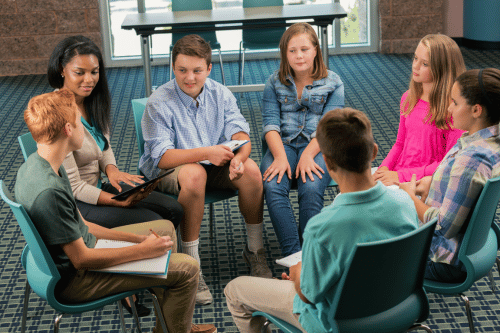9 Therapy Activities for Teens
The teenage years are a critical time for personal development, where mental health support can play a significant role in helping adolescents manage emotional challenges, build coping skills, and develop positive relationships. Therapy tailored to teens must be engaging, interactive, and effective in promoting emotional regulation and self-awareness. Activities that address common issues such as peer pressure, academic stress, and family dynamics can significantly improve outcomes in mental health treatment.
This article explores a range of therapy activities for teens that are designed to address emotional, social, and cognitive challenges, offering practical tools for personal growth.

The Importance of Therapy for Teens
Adolescents face numerous stressors, including peer pressure, social expectations, and school performance issues. These stressors can lead to mental health issues such as anxiety, depression, and emotional dysregulation. Engaging in therapy helps teens develop important communication skills, problem-solving skills, and resilience to handle life’s challenges effectively.
Therapy activities for teens serve as tools to encourage self-expression and emotional regulation. They make therapy more approachable and fun while supporting deeper emotional work. These activities also foster positive relationships and self-awareness, allowing teens to better understand their emotions, manage stress, and develop healthy habits for the future.
1. Group Therapy Activities: Strengthening Social Skills
Group therapy provides teens with a safe and supportive environment where they can interact with peers, share experiences, and build essential social skills. Through structured activities, teens learn how to manage peer pressure, verbal expression of emotions, and resolve conflicts.

Example Group Therapy Activities
Icebreaker Activities: Games like the candy game allow participants to answer questions tied to candy colors, helping them connect with group members.
Role-Playing Exercises: Teens simulate real-life scenarios to develop communication skills and problem-solving skills.
Art Projects in Groups: Working on collaborative art pieces fosters self-expression and builds connections.
The therapeutic process in group settings encourages teens to reflect on their behavior, gain insights from peers, and enhance greater self-awareness. These activities promote empathy and help young people develop meaningful friendships, reducing feelings of isolation.
2. Art Therapy: Exploring Emotions Creatively
Art therapy activities offer teens a way to express feelings that are difficult to articulate verbally. This type of therapy encourages them to create visual representations of their emotions, providing insight into their mental state and promoting self-reflection.
Benefits of Art Therapy
Promotes relaxation and enhances mental clarity.
Fosters self-expression by allowing teens to convey emotions through art.
Encourages personal growth by exploring their past self, current self, and aspirations for their future self.
Art therapy also boosts self-esteem, helping teens feel a sense of accomplishment when they complete creative projects. Whether they are drawing, painting, or sculpting, these activities help them process emotions and gain new perspectives on their lives.
3. Music Therapy: Using Sound to Heal

Music therapy engages young people emotionally, mentally, and physically. Through listening, composing, or participating in music-related activities, teens can connect with their emotions in ways that traditional talk therapy might not achieve.
Music Therapy Activities for Teens
Creating Playlists: Teens compile songs that reflect their mood or express their inner world.
Group Music Sessions: Participating in group drumming circles or collaborative music creation helps build a sense of community.
Songwriting Projects: Writing lyrics about personal experiences promotes self-expression and emotional regulation.
Music therapy activities are effective in boosting positive emotions and promoting mental health benefits. These sessions encourage teens to express emotions through sound, improving their overall sense of well-being.
4. Coping Skills and Emotional Regulation Activities
Teens often struggle to manage their emotions effectively. Therapy activities that teach coping skills and foster emotional regulation can help them develop healthy ways of handling stress, frustration, and anxiety.
Techniques to Build Coping Skills
Deep Breathing Exercises: Practicing deep breathing techniques helps teens calm their minds and reduce stress.
Journaling: Writing down thoughts allows teens to reflect on the present moment and identify triggers for negative emotions.
Mindfulness Practices: Activities like guided meditation enhance mental clarity and provide tools for managing emotions effectively.
Developing these skills helps teens navigate emotional ups and downs, building their confidence in dealing with life’s challenges.
5. Family Involvement in Therapy Sessions
Family plays an essential role in the therapeutic journey of adolescents. Including family members in therapy creates opportunities for teens to develop positive relationships and open communication within the family unit.
Family Therapy Activities
Storytelling: Teens and parents share stories from their past to build understanding and empathy.
Collaborative Art Projects: Family members work together on creative projects, promoting teamwork and enhancing emotional connections.
By involving other family members in therapy, teens learn how to express their emotions openly and build stronger family bonds.
6. Fun and Engaging Therapy Activities
Incorporating fun therapy activities into sessions can make therapy more engaging for teens. Activities that are both enjoyable and meaningful can encourage participation, helping teens connect with the therapeutic process more deeply.
Examples of Fun Therapy Activities
Animal-Assisted Therapy: Interacting with animals helps teens manage emotional challenges and develop empathy.
Creative Activities: Theater exercises, dance, or crafts promote self-discovery and boost self-esteem.
These enjoyable activities reduce resistance to therapy, making it a positive experience for teens.
7. The Role of Self-Awareness in Personal Growth
Developing greater self-awareness is essential for teens to understand their emotions and behavior. Activities that foster self-awareness allow teens to reflect on their strengths and areas for growth.
Activities to Enhance Self-Awareness
Mirror Exercises: Teens explore how they perceive themselves and how others see them.
Future Self Visualization: Teens visualize their ideal future, setting goals for personal development.
Strength Journals: Recording achievements helps boost self-esteem and track progress.
These activities help teens build a sense of identity and encourage self-reflection, leading to personal growth and improved mental health.
8. Addressing Peer Pressure and Social Stress
Many teens experience peer pressure and struggle with maintaining a sense of individuality. Therapy activities that address social dynamics can empower teens to resist negative influences and build positive relationships.
Therapy Techniques for Managing Peer Pressure
Role-Playing Scenarios: Teens practice saying no to peer pressure in a safe environment.
Group Discussions: Facilitated conversations allow teens to share their experiences and strategies for managing social stress.
Creative Problem-Solving Activities: Engaging in group challenges fosters teamwork and builds confidence.
These activities teach teens how to handle social challenges while maintaining their mental well-being.
9. Incorporating the Present Moment in Therapy
Focusing on the present moment helps teens develop mindfulness, which is essential for managing anxiety and building resilience. Activities that encourage presence can promote mental clarity and improve focus.
Mindfulness Activities
Breathing Techniques: Teaching teens to focus on their breath helps them stay grounded.
Body Scans: Guided exercises encourage teens to connect with their physical sensations.
Nature Walks: Spending time outdoors promotes relaxation and enhances emotional well-being.
These activities cultivate mindfulness, helping teens develop a balanced perspective on life.
Conclusion
Therapy activities for teens offer a powerful way to engage young clients and promote mental health. Whether through art therapy, music therapy, or group therapy activities, these methods empower teens to develop essential skills such as emotional regulation, self-awareness, and coping skills. Incorporating fun therapy activities makes the therapeutic journey enjoyable, encouraging teens to participate actively in their personal development.
Involving family members in the therapeutic process strengthens relationships and enhances emotional support. By learning how to manage peer pressure and build positive relationships, teens gain the tools needed to navigate life’s challenges with confidence.
Ultimately, these activities foster personal growth, helping teens achieve greater self-awareness and a deeper understanding of their emotions. With the right therapeutic support, teens can thrive emotionally, socially, and mentally, setting the foundation for a healthier future.









